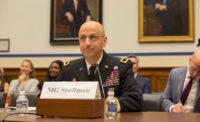The Senate has confirmed Maj. Gen. Scott A. Spellmon as the Army’s 55th Chief of Engineers and commanding general of the Corps of Engineers, elevating him to one of the most crucial infrastructure-related positions in the federal government.
Spellmon, whose long Army career includes other senior positions with the Corps, will succeed Lt. Gen. Todd T. Semonite, who has held the chief’s job since May 2016.
A Corps spokesman says that internal discussions are underway about the timing of a ceremony to mark the change of command, but no date has been chosen yet.
Along with the Senate's approval of Spellmon's nomination on July 20, it also approved his promotion to lieutenant general. The Corps spokeman says that Spellmon’s promotion orders will be effective on the date when the command changes hands.
Semonite’s four-year tour as the Corps' commander was to end on May 19, but several days before that date, Semonite said President Trump had asked him to stay on until a successor was in place.
Spellmon most recently has been the Corps’ deputy commanding general for civil and emergency operations, which includes overseeing construction and upkeep for its network of river locks and dams and a long list of harbor-dredging and environmental-restoration projects.
Before that, Spellmon led the Corps’ Northwestern Division, which sprawls across all or parts of 12 states, from Washington south and east into Missouri.
Industry Comments
Industry officials welcomed Spellmon’s confirmation. Retired Brig. Gen C. David Turner, who commanded two Corps divisions, said in an interview, “General Spellmon is going to bring a lot to the Corps over the next four years—his strategic leadership, his vision and ability to solve the nation’s toughest engineering challenges.”
Jim Walker, director of government relations with the American Association of Port Authorities, and a former senior Corps official, said in an email that Spellmon’s “extensive background in the Corps civil works program—areas like navigation and flood protection—will serve the nation well.”
Amy Larson, former long-time head of the National Waterways Conference, said in an email that she expects Spellmon to continue his characteristically collaborative approach.
Larson, now a consultant, adds that as deputy commanding general, “He demonstrated a commitment to working with stakeholders and non-federal sponsors in the management of critical civil works projects, and to including their perspectives in the development and implementation of policies and agency guidance.”
Where Semonite exudes high energy and enthusiasm—the Corps' "Energizer Bunny," as Turner has called him—Spellmon's public demeanor is calm and more measured. "They're different leaders, yet both very effective," Turner says.
John Doyle, special counsel with law and lobbying firm Jones Walker LLP, says Spellmon has a strong background in the substance of Corps issues and an understanding of the personalities both on and off Capitol Hill.
Doyle, a former senior Army civil works official, calls Spellmon "a glass-half-full kind of a can-do guy—that's the embodiment of the Corps' motto, which is 'Essayons: let us try.'"
Looking ahead, Spellmon will face difficult infrastructure issues, including a backlog of tens of billions of dollars in authorized but unfunded civil works projects, plus managing the Army's multi-billion-dollar budget for military construction around the U.S. and overseas.
Turner, now a senior adviser with water-resources consulting firm Dawson & Associates, also notes that Spellmon will face environmental challenges. The Corps is the agency charged with issuing permits for construction near bodies of water. The scope of that authority has been the subject of a recently issued Trump administration rule which narrows the reach of that authority. The new rule has drawn heavy criticism from environmental groups.
Doyle says Spellmon's biggest challenge is the same as Semonite's: "Operating nonpartisanly and being perceived as being nonpartisan in an increasingly toxic, partisan world."
He adds, "And the [border] wall is a perfect example of what I'm talking about."
Border Wall
Trump has long seen the construction of a new barrier along the U.S.-Mexico border as a high priority. The Corps is supervising much of the wall construction, working for the Dept. of Homeland Security.
In February, in his latest State of the Union address, the president said that in early 2021, "substantially more than 500 miles" of wall would be complete. As of July 21, approximately 245 miles had been finished, according to the U.S. Customs and Border Protection agency.
Trump's moves to shift money to wall construction from military construction and other parts of the Defense Dept. budget have been the center of a fierce partisan battle between the White House and its allies in Congress and House and Senate Democrats.
Pending House appropriations bills, drafted under the leadership of Democrats, include language to block further funding transfers to the wall.
Doyle expects Spellmon to follow Semonite's approach to the wall, which Doyle characterizes as being "an instrument of the federal government to carry out the policies that we're tasked to carry out.'"
"The Corps' reputation has not been sullied," Doyle adds. "The challenge is now being handed off to Spellmon—it's been part Spellmon's anyway, so it's not going to be unfamiliar territory for him by any stretch of the imagination."





Post a comment to this article
Report Abusive Comment